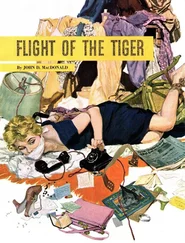But, he thought, it might be the best thing of all to keep the Lieutenant out of it until it was all over, one way or another. If the little thing died, in spite of all the nursing care, he’d make up a nice box and bury her nice and say the words, and keep some fresh flowers over her for a time.
If she come out of it, she would be poorly for a time until the strength came back to where she could go driving off in that boat, smiling, waving back, calling out Thank you, Sergeant, Goodby, Sergeant, Thanks for everything, until her girl-voice faded into the distance.
Clothes! Now either way there’d have to be clothes. Not a thing on this boat except the naked little swim clothes. She’d have to have something to wear as she was getting well. And she’d want the other girl things too, comb and lipstick and such, and a purse to carry them in.
Until he could get it worked out, maybe one of his two good white shirts would come long enough on her so it could be sewed into something to cover her decent. Some pretty white nylon line off this boat for a belt. For a little bit of pretty, she could have that pin he’d found on the beach, with the red stone.
Later he could work out some way to get her the necessaries. Get some woman to buy things he could bring back. One of the girls in the bank where he cashed the government check every month? No, she might tell the Lieutenant. Then one of the women that hung around Shanigan’s Waterfront? Every once in a while, maybe not as often as every two months, those women would start coming into his mind no matter how hard he tried to keep them out, and then one night he would open the box and take out a twenty and a five and go over in the skiff and tie up at Shanigan’s and sit at the bar, and by the time the five was mostly drunk up, there’d be one of them handy to take him on back past the lady’s and men’s, into the storeroom, onto that busted old couch jammed up into the corner, making sure she had the twenty before she’d take off her skirt and pants, all beefy white meat there in the same light that always came in the little high dusty window, blinking red and white, red and white, over and over, fast as a heart beat, from Shanigan’s sign that hung over the docks. The light always the same, and the itchy need for it always the same, and no matter how different they looked out by the bar, in the little room it was always like exactly the same one, thick white belly and thighs, the dark smudge, big handfuls of the softness, and no poor damned way in the world to slow it or stop it or change it until too sudden it was over.
No, not one of them night women. Not one of them who took the money and made fun. Dumb Corpo. Herman the Hermit. Where’s your medals, Sarg? Going back in the skiff he’d have to fight to stay awake, and the whisky would have turned sour on his stomach, and all the next day he’d tell himself he’d never go back there, not ever again, no sir. There wasn’t a one of them fit to pick out clothes for the Missy, even touch them.
Just at the edge of sleep he was brought back by a frightful and familiar sound, and he knew one of the big owls had drifted silently into his clearing, carrying in its talons one of the small white terns from the sand spit at the inlet. The victim shrieked and squalled its panic, seeming to beg for mercy, and audible under the terror cries were the owl sounds, a deep hoo-ha-hoo-ho-ha, a rich continuing throaty chuckle of satisfaction. The tern sounds weakened to a whimper, ended with a final whistly squeal. In the silence the owl chortled a time longer before settling to the feast.
Better explain to Missy about that before it happens some night when she’s on the mend.
The wire-service stringers in Nassau, as a result of interviewing the Barths and the Hilgers, the two couples aboard that Jacksonville Chris-Craft which had taken Captain Garry Staniker off South Joulter Cay and rushed him to Nassau, were able to phone in reasonably complete accounts of the disaster in time to hit the Saturday morning newspapers.
CAPTAIN SOLE SURVIVOR IN YACHT EXPLOSION was the page-one head on the Miami Record . Raoul Kelly, eating a late lunch-counter breakfast noted that the paper had rerun a photograph an alert reporter had unearthed earlier in the week, taken at a Miami marina by a boat buff who had been far more interested in the lines of the custom cruiser than in the people aboard. It had been taken moments after the lines had been taken aboard. Staniker, at the wheel on the flying bridge, was half turned, backing the Muñeca out of the slip. Mr. Bixby Kayd, looking enormous in swim trunks and a terry beach coat, and wearing big dark glasses and a baseball cap, stood on the cockpit deck, leaning over the rail, fending off a piling with a big hand. Roger stood near the bow rail, making up a line. Carolyn Kayd — and few news reports failed to mention she had been first runner-up in the Miss Texas contest four years ago — lay supine on a beach towel spread on the trunk cabin roof, one knee hiked up, the briefness of her bikini and the camera angle giving more than ample reason for the approval registered by the contest judges. The little dark daughter, Stella, was up on the flying bridge standing by Staniker, looking back as he was. Just visible toward the stern, beyond Stella’s father, was the boat guest, Leila Boylston, a very trim and pretty young lady, making up one of the stern lines. Only Mary Jane Staniker was missing, and could be presumed to be below engaged in housekeeping duties. On an inside page Raoul found a simplified map of the central portion of the Bahamas, showing New Providence, the Berry Islands, and the Joulter Cays at the north end of Andros. The artist had marked a spot to the right of the Joulter Cays with a tiny symbol of a boat with little streaks erupting from it to indicate explosion.
Raoul read the whole account carefully, ordered more coffee and read it through again. Staniker’s condition was fair. He had some bad burns. He was in Princess Margaret Hospital, and had been unable as yet to confirm what he had told the Jacksonville couples after being rescued.
One small detail bothered him. It said that prior to their being employed a month ago by Bixby Kayd, Staniker and his wife had operated Parker’s Marina south of Tahiti Beach on Biscayne Bay. He had learned from Francisca that Captain Staniker, Crissy Harkinson’s frequent visitor, had been working somewhere not too far from Crissy’s home, but he had not known what it was. He had passed Parker’s Marina enough times to remember it as a dreary little beer-bait-boats place.
With the newspaperman’s instinct for just how much coincidence was acceptable, he felt something a little curious about the interrelationships involved. Ferris Fontaine, Crissy Harkinson, Kayd, Staniker. Staniker had been sneaking away from the drab little marina to continue his red-hot affair with the lady who had sold the Odalisque out from under him. Kayd visits Crissy in March. Why would Kayd hire somebody who apparently couldn’t locate another job as hired captain? Why couldn’t Staniker find another job? The cruiser the Senator gave Crissy had been sold in early January.
He shrugged and pushed it out of his mind. Obviously, if there was something fishy about the whole thing, any attempt to unravel it would involve ’Cisca because she was the only one who could swear to Kayd’s visit to the Harkinson woman. And what would that kind of fuss do to ’Cisca’s precarious adjustment? What would it do to her to be taken to a place full of men in uniform and asked questions?
It is, after all, gringo trouble, and none of our business, he thought. The attitude filled him with a mocking amusement. The refugee attitude. Or, more accurately, the peon syndrome. Let the rich slay each other at will. Each one is one less.
Читать дальше






![Джон Макдональд - Wine of the Dreamers [= Planet of the Dreamers]](/books/430039/dzhon-makdonald-wine-of-the-dreamers-planet-of-thumb.webp)




![Джон Макдональд - The Hunted [Short Story]](/books/433679/dzhon-makdonald-the-hunted-short-story-thumb.webp)
